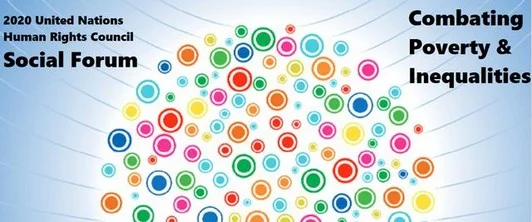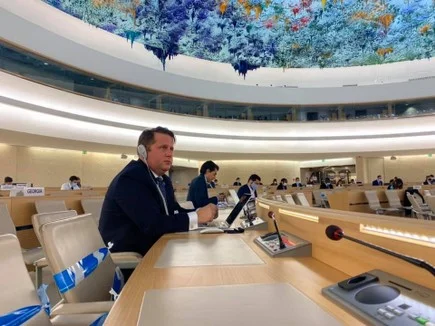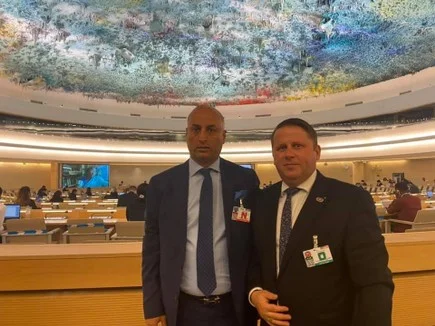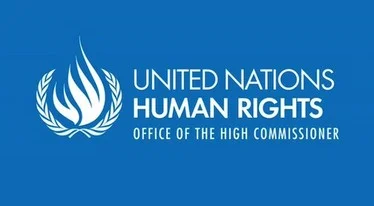12th UN HRC Special Session in Geneva
Foreign Affairs > Information > Supranational > UN
The IHRC delegation in persons the Secretary General Rafal Marcin Wasik and Ambassador at Large in Switzerland Khalid Chagna, are participating today in the 12th UN Human Rights Council Special Session in Geneva.
Due to the COVID-19 pandemic and sanitary restrictions, the main meeting is held in Room XX, in which only 1 person from each registered organization participates. The other members of the delegation may follow the proceedings on screens in other rooms of the 2020 Social Forum.
 Secretary General IHRC
Secretary General IHRC Prof.h.c. Rafal Marcin Wasik
The Social Forum is an annual meeting convened by the Human Rights Council. It provides a unique space for open and interactive dialogue among all stakeholders on a specific theme chosen each year.
In 2020 the Social Forum take place on 8 and 9 October at the Palais des Nations in Geneva. In accordance with resolution 41/24 of the Human Rights Council focuses on “Good Practices, Success Stories, Lessons Learned and Current Challenges in Combating Poverty and Inequalities”.
 The 2020 Social Forum convened at a time when the world faces the worst economic downturn since the Great Depression, following the Covid-19 pandemic. In all countries, low-income earners and people in poverty are the first victims: particularly at risk are workers in the informal sector or in precarious forms of employment (respectively 1.6 and 0.4 billion workers globally), who have no or only weak access to social protection. Following the crisis, the figures of extreme poverty are expected to rise significantly: using a baseline of 3.20 USD/day in PPP, it is estimated that 176 million more people may fall into extreme poverty.
The 2020 Social Forum convened at a time when the world faces the worst economic downturn since the Great Depression, following the Covid-19 pandemic. In all countries, low-income earners and people in poverty are the first victims: particularly at risk are workers in the informal sector or in precarious forms of employment (respectively 1.6 and 0.4 billion workers globally), who have no or only weak access to social protection. Following the crisis, the figures of extreme poverty are expected to rise significantly: using a baseline of 3.20 USD/day in PPP, it is estimated that 176 million more people may fall into extreme poverty.The forum is also organized against the backdrop of a time of worldwide protests against racism, racial discrimination, structural and systemic inequalities and injustices as well as climate change and other major challenges. Climate change, racial discrimination and other persistent challenges are likely to aggravate poverty and inequality both within and among countries.
While the multiple challenges are both profound and unprecedented, the crisis also provides an opportunity to expand and strengthen social protection floors and to guarantee living wages for all workers, as a means to support the economic recovery and to build more resilient societies in the future. To eradicate poverty, however, a range of actions should be taken at different levels. At the international level, trade and investment, the alleviation and restructuring of external debt and official development assistance should enable and support efforts at the domestic level to effectively reduce poverty. At the national level, governments should be held accountable to adopt progressive taxation schemes to mobilize domestic resources, and public budgets that give priority to social protection, as well as to other forms of social investment (in education, health and housing in particular). They should ensure that social protection schemes and public services effectively reach people in poverty. This requires removing a variety of obstacles in accessing such services, including corruption, discrimination, lack of remedies, and other factors leading to a non-take-up of rights by those who need most to be supported. Finally, national governments should address factors that perpetuate poverty and lead to the intergenerational transmission of poverty, including institutional and social maltreatment, discrimination on grounds of socio-economic status, disempowerment of people in poverty, poor nutrition, and limited educational opportunities.
The unique feature of this year's Social Forum lies in the space it creates for participants to consider and converge on a poverty "matrix": a complex but unified scheme examining the interrelatedness of different causes of poverty, from the micro-level causes to the more macro-level and international causes rooted in communities and households, through the meso-level causes in governmental policies, in particular in their fiscal and budgetary choices.






